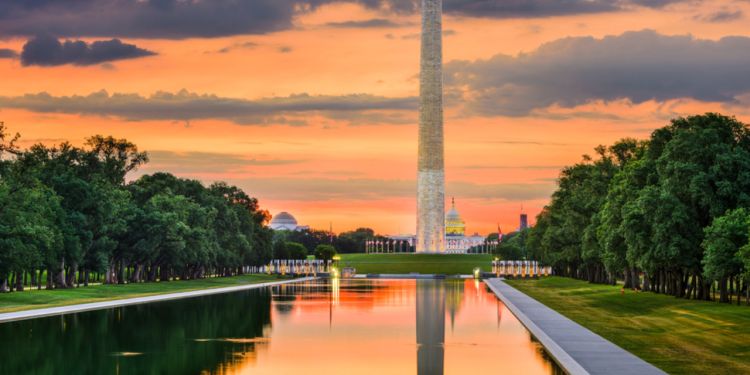
Located in the District of Columbia, Washington, DC, is the federal capital of the United States. Being the political heart of America and the home base of some of the most powerful people in the country, it's no surprise that Washington DC also boasts some world-class universities.
Why study in Washington, DC?
Washington, DC, has so much to offer. Home to the US Federal Government headquarters and some of the most important and iconic cultural monuments in the United States, you will feel like you're living in a place where history and power are everywhere. The White House, the Capitol, and the Lincoln Memorial, where Martin Luther King Jr. delivered his famous "I have a dream" speech, are all on your doorstep. Unsurprisingly, Washington attracts many students of Political Science and International Business.
Washington, DC, is not attached to any state; instead, it's a district – with the DC standing for District of Columbia.
Around 14 percent of DC's population hails from other countries, and these foreign-born residents play a crucial role in the city's workforce. Nearly three-fifths of immigrants in DC hold a college degree or higher, and over four-fifths are proficient English speakers.
The fact that its population is quite young (on average, 34 years old) makes DC an incredibly dynamic city, where mostly young people, business people, politicians, and students live.
If you are planning to continue your studies in the United States and you are ready to settle in DC, here is the essential information to help prepare for your studies. Do not hesitate to pursue your search by asking your questions or sharing your experience on the Expat.com Washington DC forum.
Where to study in Washington, DC?
The US capital has several universities ranked among the best in the United States, according to QS University rankings. Below, we summarize what makes Georgetown, GWU, and the American University excellent options for international students.
Georgetown University
Georgetown University, founded in 1789, is a prestigious private research institution located in Washington, DC. Renowned for its vital academic programs and commitment to public service, Georgetown offers various undergraduate, graduate, and professional degrees across various fields, although it is most famous for its international relations, law, business, and social science programs. With its prime location in the nation's capital, students have unique opportunities to engage with government agencies, international organizations, and influential leaders.
Georgetown University takes pride in its diverse and inclusive community, attracting students from all around the world. The university's commitment to international education is evident in its substantial international student population, representing over 130 countries. The university's Office of Global Services provides comprehensive support to international students, helping them navigate visa and immigration processes, cultural adjustments, and other necessary resources.
George Washington University
George Washington University (GWU) is a distinguished private research university situated in Washington, DC. Founded in 1821, it attracts a diverse student body from all 50 US states and over 130 countries worldwide. With approximately 12,500 undergraduate students and 15,000 graduate students, GWU offers over 200 academic programs in renowned fields such as political science, international relations, law, public health, and business. Its main campus in the quaintly named Foggy Bottom provides access to the city's rich political, cultural, and economic resources, making it an ideal location for students seeking a dynamic learning environment.
The university places a strong emphasis on supporting its international student community. The Office of International Services assists with immigration matters, cultural adjustment, and various support services, ensuring that international students have the necessary resources to thrive academically and personally during their time at GWU. Students can engage in a vibrant campus life with numerous student organizations and clubs, fostering a well-rounded college experience.
American University
American University (AU) is a renowned private research university situated in Washington, DC. Founded in 1893, it has earned a reputation for its strong emphasis on public affairs, international relations, and political science. AU offers a diverse array of undergraduate, graduate, and professional programs.
One of AU's key strengths lies in its commitment to global education and welcoming international students. With a diverse student body representing over 150 countries, AU fosters a genuinely international and inclusive learning environment. The university's International Student & Scholar Services supports its international students, assisting them with visa processes, cultural adaptation, and integration into campus life.
Tuition fees and scholarships in Washington, DC
In the United States, the cost of one year of study varies according to institutions. Tuition fees are similar at the three universities mentioned above, ranging between USD 50–60,000. These amounts take into account the annual enrollment and tuition fees.
Most American universities have a scholarship system to ensure access to education for as many students as possible. The Merit Scholarship is designed to financially support students with outstanding academic achievements, while grants based on social criteria are awarded to those with limited financial resources.
If you rely on scholarships to fund your studies, it's crucial to check if your desired university offers financial aid options for international students, as not all institutions do. Additionally, it's important to note that none of the universities in Washington, DC, follow a “need-blind admission” policy, which means they do consider an applicant's financial situation when making admission decisions. This might affect your chances of getting accepted into a university in the city if you require financial assistance.
Grading system and courses in an American university
In America, school starts either in September or November, depending on the institution. Some of them also offer the possibility to begin in January, but this option is not always open to international students.
Like most of the world's universities, classes are conducted in small groups in a classroom or an auditorium. Final exams take place at the end of the semester, but in between, students have work assignments.
Grades assigned by teachers are percentages, which are then converted into a letter from A to F, based on the US Grade Point Average (GPA) system, which serves as the overall average. Every homework is given a score between A and F. A is the highest score (4.33 points), and F is the lowest (0 points).
Diplomas in an American university
Be aware that there is no diploma equivalence between Europe and the United States, except if it involves an exchange program with a European university. If you start your higher education in the United States, it's recommended to complete the entire degree so it won't be a wasted year.
These are the following university degrees:
- Associate's Degree (two years);
- Bachelor's Degree (four years);
- Master's Degree (six years);
- Ph.D. (up to ten years).
Students are considered undergraduate students until they complete their Bachelor's Degree, after which they become graduate students if they're doing a Master's program, and then postgraduate students when they begin their Ph.D.
Student visa and administrative procedures in Washington, DC
Once you are accepted into the American university of your choice, you must take the necessary steps to obtain your student visa. Depending on your study program, you will either need an F1 visa, the most commonly granted to international students, or an M1 visa, usually aimed at students in technical fields.
The F1 visa is awarded to full-time students who plan to complete their entire cycle program at an American university. It expires only when the student has completed his university studies. The M1 visa is for vocational education students; it is valid for one year but can be renewed up to three times. The J1 visa is granted to exchange students while remaining enrolled in their home school. Note that whatever your visa, the administrative costs are at your expense and amount to an average of $300–500.
Before granting you a visa, the US embassy will call you for an interview to learn more about your motivation for studying overseas. Be aware that the officer will seek to understand your intentions in the long term and will make sure that you do not plan on settling permanently in the United States at the end of your studies. The conversation will take place in English to check that your level is sufficient, as it must be proven by your TOEFL or IELTS score (required).
If you are struggling with the visa application process, your university's international student center may be able to offer guidance and support; however, you are responsible for submitting all applications and materials.
Working as a student in Washington, DC
The F1 student visa gives you the right to work on campus from your first year if your university provides you with an acceptance letter. This will allow you to get your social security number, assigned by the government and mandatory for paid work on US soil. Please note that you can't work off campus with the F1 visa except with rare permission, such as if a tight financial situation requires you to.
Students with an M1 visa are not allowed to work at all. On the other hand, it is possible to do an internship under some conditions. In this case, you must apply for a work permit from the US government.
Last but not least, health coverage is mandatory for all students in an American university, including foreigners. It can come from your home country if it covers you internationally, or you must get American health coverage. Contact your university for more information on their in-house coverage.
Living cost in Washington, DC
Unfortunately, the US capital is not a cheap city, and you should know that when it comes to daily expenses (shopping, transportation, eating out, leisure, etc.), the living cost here is higher than in many other places. Do your research so you aren't hit with a nasty surprise.
Remember when eating out that tipping waitstaff is expected, meaning 15% to 20% will be added to your total. This is not optional – it's basically mandatory to tip in restaurants in the US, and not doing so will result in the waiter calling you out. However, even if you are on a tight budget, it is possible to enjoy Washington DC, thanks to many discounts available with a student card.
Student housing in Washington, DC
Like in most American universities, living on campus is always a great idea, especially for an undergraduate student discovering university life. Regardless of which university you study at, it will usually offer on-campus housing for first-year and international students.
In fact, international students have reserved floors in some universities' residences. For instance, Georgetown University has an International House Residence, which offers accommodations for one or two students, private bathrooms included. It is up to international students to prepare and complete the accommodation process.
As soon as you have your hands on your acceptance letter, you have to log into the university website with the provided personal login to fill in your accommodation application.
Good to know:
The sooner you submit your application, the more likely you will get the room or apartment you choose on campus. Bear in mind that these places are limited, and there are a lot of requests.
If you can not or do not want to live on campus, there are always other fellow students renting studios or sharing flats in downtown Washington, DC. Georgetown University provides a guide of helpful information on life and accommodation off-campus. The neighborhoods of Foggy Bottom, Dupont Circle, Logan Circle, and Adams Morgan are particularly dynamic and acclaimed by students. The average rent for a central apartment in Washington, DC, is $2,470.
For tighter budgets, the small towns of Arlington and Alexandria, both in the state of Virginia but only a few subway stations away from central DC, are also popular with students. Both located on the other side of the Potomac River, they offer a more peaceful life.
Student life in Washington, DC
Washington, DC, has an undeniably rich cultural and historical heritage, with iconic landmarks like the Capitol and the White House that almost anyone would recognize. The city offers free access to many museums, making it a cultural haven for budget-conscious visitors. From the National Gallery of Art to the Newseum and Phillips Collection, these museums attract visitors from around the globe.
In addition to being a hub for international business and culture, DC has become a popular destination for people from all walks of life. Tourists can explore the city's attractions or enjoy the vibrant nightlife at favorite bars and top-rated Michelin-starred restaurants. Arlington, Virginia, just a few blocks from downtown, houses the renowned Pentagon, the headquarters of the Department of Defense. Furthermore, the scenic Chesapeake Bay in Baltimore, just an hour away, offers tranquillity and natural beauty.
Useful links:
International Student - Website for anyone studying or wishing to explore in Washington, DC.
Scholarships - Useful information about American university admission fees, tuition fees, and awards. The 'Washington DC' section will provide essential information about Washington's universities.
Study in the USA - This website provides essential information about studying in the United States and the steps you can take to prepare for your stay.
Housing in Washington DC - Compare Washington DC rental prices by neighborhood and accommodation type.
We do our best to provide accurate and up to date information. However, if you have noticed any inaccuracies in this article, please let us know in the comments section below.
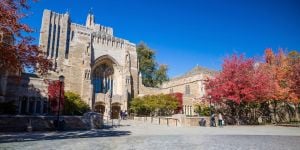
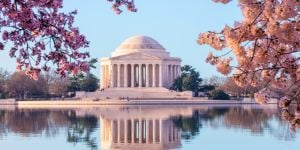
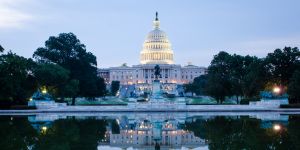

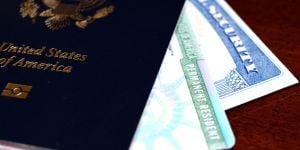







Comments